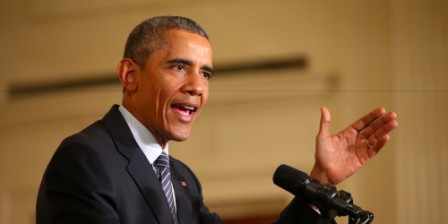Obama's Democrats rally magic number of Iran deal votes
Washington
US President Barack Obama on Tuesday reached the key threshold of 41 Democratic senators who have voiced support for the Iran nuclear deal, enough to block a resolution disapproving of the controversial accord.
Should all 41 vote against advancing the Republican-backed resolution, a blocking procedure known as a filibuster, the effort to kill the landmark agreement would remain bogged down in the 100-member Senate, ensuring a major political victory for Obama.
The White House launched an all-out lobbying effort to get lawmakers to back the international agreement that scales back Tehran's nuclear program in exchange for an easing of crippling economic sanctions.
Obama last month had won enough support to sustain the veto he would lodge if Congress, which returns to work Tuesday after a summer recess, were to disapprove of the accord.
Four Senate Democrats stand opposed to the deal, including Chuck Schumer, who is expected to be the next Democratic leader in 2017.
As of mid-day Tuesday, Maria Cantwell remained the lone undecided Democrat.
The House of Representatives is scheduled to vote on its resolution of disapproval on Friday.
But with Senators Ron Wyden, Gary Peters and Richard Blumenthal joining Obama's nuclear deal camp Tuesday, there are enough votes to prevent the resolution from advancing in the Senate.
Some Democrats, including Senator Chris Coons, are reportedly suggesting they would prefer a direct up-or-down vote on the resolution instead of blocking it.
But if all 41 filibuster the resolution, Republicans would not have the 60 votes necessary to advance it.
"While this is not the agreement I would have accepted at the negotiating table, it is better than no deal at all," Blumenthal said in a statement, highlighting the threat of a crumbling Iran sanctions regime if the accord collapses.
Should Washington walk away from the deal that it negotiated along with Britain, China, France, Germany, Russia and Iran, "the United States, instead of Iran, would be isolated," he said.
"Iran's nuclear program would be unconstrained. Rejection would fracture our unified efforts with allies and greatly weaken international pressure on Iran and American leadership, especially if economic sanctions are needed."
Many Democrats backing the deal have done so reluctantly or with skepticism, particularly due to what Wyden called "the history of Iran's deception."
"This agreement with the duplicitous and untrustworthy Iranian regime falls short of what I had envisioned, however I have decided the alternatives are even more dangerous," Wyden said.
Related Posts

